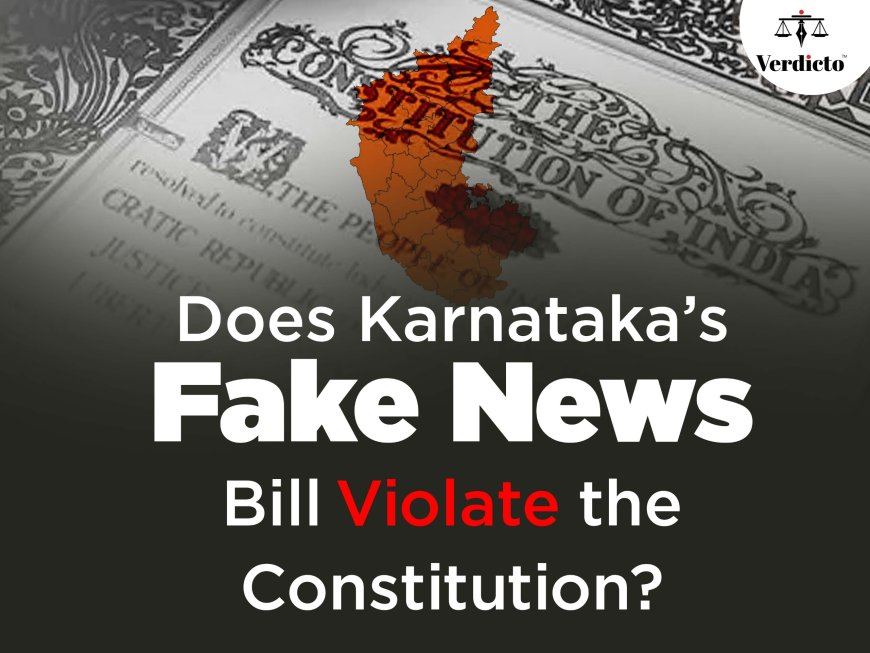Does Karnataka’s Fake News Bill Violate the Constitution?
Karnataka’s Fake News Bill, 2025 aims to curb misinformation but raises constitutional concerns over free speech, legal liability for social media, and vague provisions. Read a detailed analysis.

The Karnataka Misinformation and Fake News (Prohibition) Bill, 2025, introduced by the state government. The bill seeks to curb the spread of misinformation and fake news on social media by criminalising offenders. However, its provisions have drawn criticism for being vague and overly broad in scope, raising concerns about potential misuse and threats to free speech.
Karnataka’s IT-BT minister Priyank Kharge said, “We're not trying to change any policy. We're just trying to connect the dots that already exist and make a bill out of it.” “We are not doing anything such as tampering with the IT Act, 2000. We are merely categorising any public interest information as true or false.
Highlights of the Bill
The Karnataka Misinformation and Fake News (Prohibition) Bill is a new 11-page draft law that aims to stop the spread of fake news and misinformation on social media. It proposes strict punishment for those who break the rules.
Punishment
· If someone is found guilty of posting fake news on social media, they can be jailed for 2 to 5 years.
· If the fake news is serious, the punishment can go up to 7 years in jail and a fine of ₹10 lakh.
· Helping or encouraging someone to post fake news can also lead to 2 years in jail.
· These offences are cognisable and non-bailable, which means police can arrest without a warrant and bail is not easily granted.
Social Media Regulatory Authority
The bill also proposes to create a six-member authority to monitor social media. It will include:
· The Minister for Kannada and Culture as Chairperson,
· One member each from the Legislative Assembly and Council,
· Two members from social media companies, and
· A senior government officer as Secretary.
What the Bill Prohibits:
· Posting content that disrespects Sanatan beliefs and symbols.
· Promoting superstition.
· Posting abusive, obscene, or anti-women content.
· Any content that spreads fake news or insults the dignity of women.
· It also gives 30 days for people to respond if they receive a notice for breaking the rules.
The concern raised related to this bill as acc. to the activist the bill stand on shaky constitutional grounds .
The issue with Karnataka’s Fake News Bill, 2025
The Karnataka Misinformation and Fake News (Prohibition) Bill, 2025 is under fire for being badly written and clashing with existing central laws like the Information Technology (IT) Act, 2000. Its constitutionality is being questioned, meaning it may not follow the rules set by the Indian Constitution.
Under the Information Technology (IT) Act, social media companies are given a type of legal protection known as "safe harbour." This means platforms like Facebook, X (Twitter), or Instagram won’t be held responsible for what users post on their sites—as long as the companies follow certain rules. However, the Karnataka Bill takes away this protection. It says that social media platforms can be punished for breaking the law, even if the illegal content was posted by users, not the companies themselves. This makes it unclear and risky for social media companies to operate, as they might face legal action for something they didn’t directly do.
Issues with the Constitution
The Indian Constitution guarantees freedom of speech under Article 19(1)(a). However, this right can be limited under Article 19(2) for certain specific reasons like:
· Maintaining public order
· Protecting morality and decency
· Ensuring national security
· Safeguarding India’s relations with other countries
But the Karnataka Bill goes beyond these limits. It plans to punish people for things like:
· Promoting superstitions
· Criticising or disrespecting religious beliefs
· Posting content that is called anti-women or unscientific.
These reasons are not mentioned in Article 19(2), so they don’t justify restrictions on free speech under the Constitution. That makes parts of the Bill possibly unconstitutional.
Courts have already rejected similar laws in the past. For example, the Bombay High Court struck down a law that gave the government power to decide what is fake news. The court said it was too vague and gave the government excessive control, which could harm free speech.
Conclusion
The Karnataka Bill tries to fight fake news but does so in a way that could harm free speech, confuse laws, and give too much power to the government. A better, balanced, and constitutional approach is needed to handle misinformation in today’s digital age.
Read Bill







